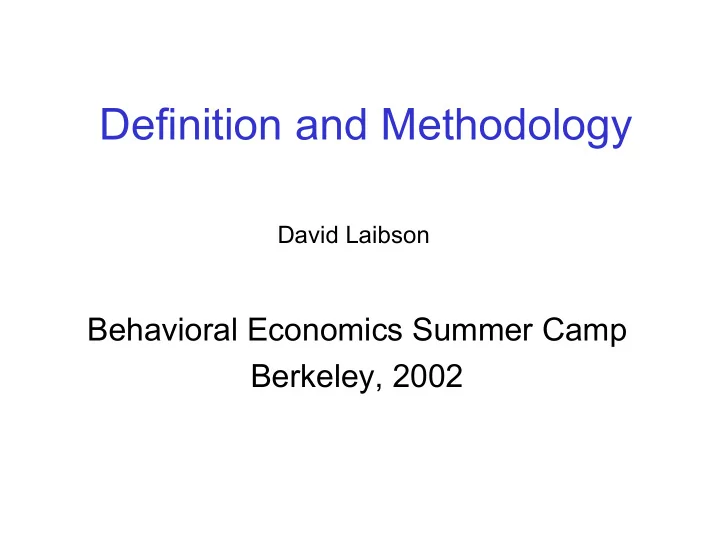

Definition and Methodology David Laibson Behavioral Economics Summer Camp Berkeley, 2002
Names • Behavioral economics (name irritates profession; who does non-Behavioral economics?) • Psychology and economics • Subfields: Behavioral Game Theory, Behavioral Macro, etc…
Definition: Behavioral Economics • Adds more psychology to economics, particularly cognitive and social psych. • Explores alternatives to perfect rationality • Emphasizes microfoundations (I.e., preferences and cognition) • Takes experimental evidence seriously (but doesn’t rely exclusively on it)
Please don’t confuse with... • Experimental economics (to follow) • Evolutionary economics (BE takes preferences and cognition as primitives; BE’s think preferences and cognition are much easier to measure than to impute from the ancestral environment) • Psychology (to follow)
Is behavioral a field? No: Yes: • Few “pure” jobs • Some courses • No journal • Some seminars • Why ghettoize? • Many conferences Future field status uncertain.
Methodology • Lab empirics (experiments) • Field empirics • Theory
Lab empirics (experiments) • High internal validity (“How confident can I be in my specific causal model?”) • Low external validity (“How well do the results generalize to the ‘real world’?”) • Complement with (not substitute for) field research
Experimental External validity problems: • unrepresentative subjects • under-experienced Internal validity subjects • confounds (aka • under-incentivized experimental tasks artifacts) • non-naturalistic • demand effects (are problems the subjects trying to • (some of these cut respond to the opposite ways!) perceived goals of the experimenter?)
“The Rules”: Adapted from George Loewenstein “The Rules” Psych. Exp Econ. Beh. Econ. Deception OK Prohibited Avoid unless…. Incentive- Rare Required Generally used compatibility Context Often rich Attempt to strip • Often studied away • Context unavoidable Randomization Always Sometimes Absolutely critical if you want to isolate the effect of your treatment Documentation Summary Experimental Experimental of design instruments; economists have it complete right dataset • Important if you Stationary Almost Common (plus replication never emphasis on care about last period) learning. • First period also of great interest
Experimental Debriefing Aggressively use debriefing surveys. For example... • “Was the experiment confusing?” • “What strategies did you use?” • “What was the experiment about?”
Experimental odds and ends... • Run a pilot (debrief pilot!) • Consider measuring expectations and other non-observables. • Consider collecting demographic info. • Consider measuring process (aka process tracing).
Field empirics • High external, low internal validity. • In the field, it is often hard to pin down the causes of phenomena (e.g., problems of reverse causality and omitted variable biases plague empirical studies). • Test multiple predictions to rule out competing hypotheses. • Make sure you know exactly how your model is identified.
• Don’t make the mistake of glibly overlooking rational explanations. • But, don’t automatically accept rational actor “just so stories” (in practice rational actor model can be just as ad hoc as behavioral models) • When faced with competing explana- tions, remember that the parsimonious explanation is usually right. • Behavioral explanations needn’t be the only explanation.
Theory • Is it cute math, or are you talking about something potentially real? • Is it real but minor? Don’t study arcana. • Can your theory be generalized? How wide is the scope of applicability? • Is it parsimonious?
• Does it generate non-obvious implications (are they true)? • Does it explain things that you already knew? Only OK. Does it predict new things that you can confirm? Better. • Is it so general that it makes no predictions? (multiple equilibria?!) • Could it become a workhorse for other economists (is your model a tool economists can use)? • Does it truly explain an anomaly or is the success a coincidence?
Hybrids • Experiments in the field (interventions) • Natural experiments • Structural estimation ( GMM, MSM, MLE ) Lots of action in these and other hybrid categories.
Finding a good question! • It should interest your non-academic relatives. • It should have (potentially) important consequences. • It should ultimately be about something that we can measure. • It should interest you. Your passion is the most important ingredient.
Publication • Research rules differ according to field. • Paper styles also differ by journal. • Throughout your research, ask yourself: Who is my audience? • Don’t spend an eternity getting your research out. Circulate drafts to colleagues, including critics. • Talk about your research with others. • Take risks picking research questions.
Professional Development • Journals? • Job market strategies? More on this next week...
Recommend
More recommend